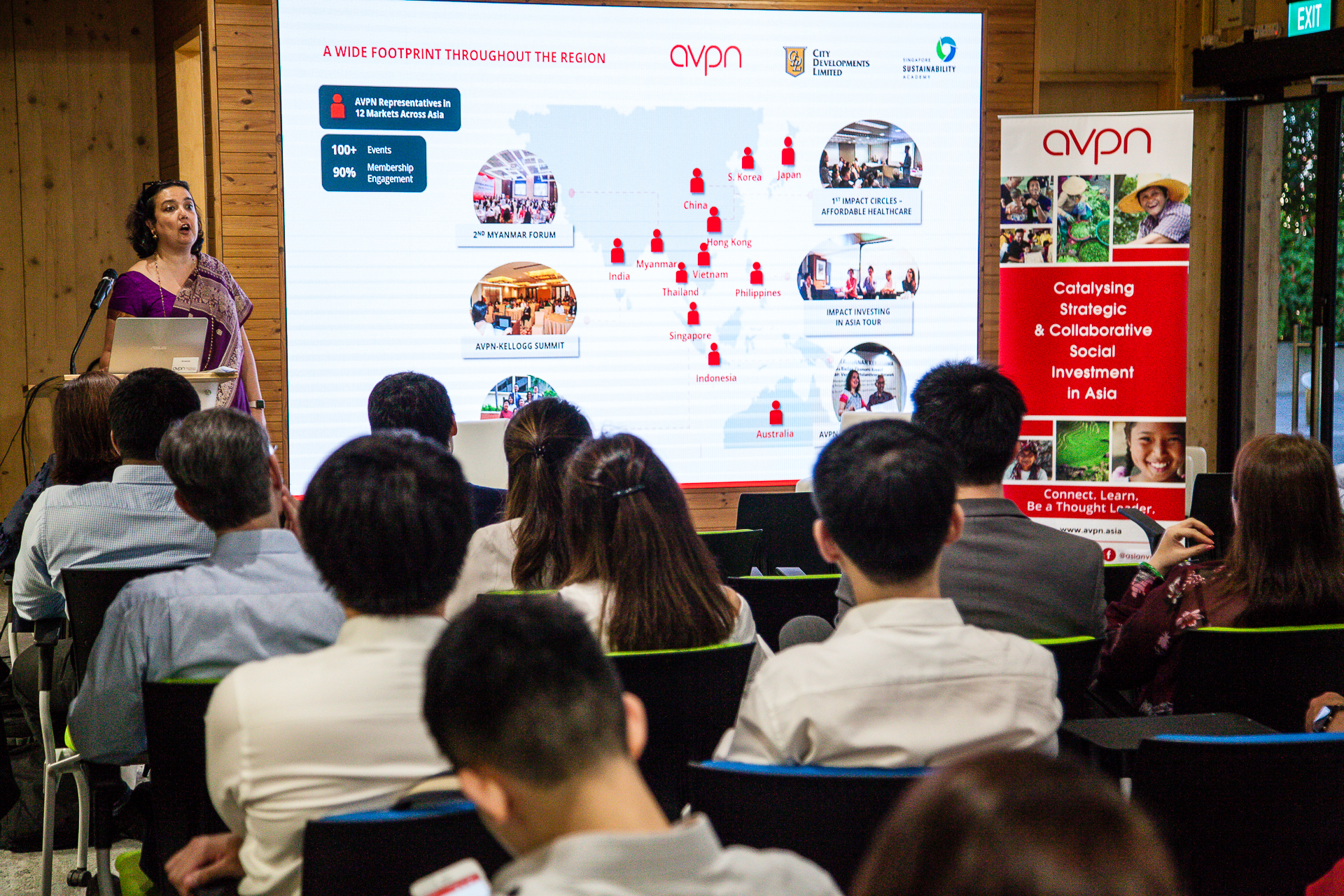By Christina Ameln, CSR | Sustainability Advisor –
An insight to social impact investing in Southeast Asia according to Outi Annala, Southeast Asia Director, the Asia Venture Philanthropy Network (AVPN).
There are nice people in finance.
While this might seem a funny way to begin an article, it is meant to counteract memories of the movie ‘Wall Street’ and its ‘greed is good’ mantra. This is what many people think of when they hear the term “finance industry”. I can’t blame them. But there is in fact a new breed of investors – those that think beyond monetary returns and embrace sustainability and impact.
Social Impact + Financial Returns
For those that believe that each generation should leave behind a better world for the next one, investors are strange bedfellows. Yet an increasing number of investors and institutions – from traditional banks to impact investors – are betting on a new combination of goals that includes sustainability. They are pursuing social impact investing, which capitalizes investments that create positive social impact alongside financial returns.

Outi Annala, Southeast Asia Director, the Asia Venture Philanthropy Network (AVPN).
Outi Annala, Southeast Asia Director, from the unique funders network the Asia Venture Philantrophy Network (AVPN) works at making it happen. Based in Singapore, this membership organisation works with different sectors from impact funds, financial services, corporates, etc. and has a mission to catalyse the movement toward a more strategic, collaborative and outcome focused approach to social investing, ensuring that resources are deployed as effectively as possible to address key social challenges facing Asia today and in the future. Not only is Outi highly capable, she is also one of the nicest people who happily picks up the phone and generously shares her best sustainability and regional advice.
As an advocate for partnerships and innovative collaborations, Outi believes these are the key enablers of a sustainable inclusive future and has worked in different sectors to drive sustainable social impact through concerted action. I am drawn to Outi for all the following reasons. Becoming a mother has further reinforced the need to contribute to positive impact. She is an international Finn, as much as I am an international Swede. And she is committed to social impact. Outi currently leads the AVPN’s activities in developing the social investment ecosystem in this strategic region and has seen first-hand the growing interest in social impact investing in the region, “From AVPN’s 500+ members, over 35% are based in Southeast Asia and many more are active or interested in investing in the region”.
A Fresh Look at Sustainability
Clearly, then, sustainability is here to stay! When I ask people for a definition of sustainability, I get a wide range of answers. Outi’s definition is particularly compelling: “Sustainability is an outcome of a global collaboration, from governments to private sector, to social investors to private individuals. Everyone has a role to play. The United Nations summarised this well in their Sustainable Development Goals (SDGs) for 2030, creating a ‘blueprint for dignity, peace and prosperity for people and the planet, now and in the future”.
 According to Outi, investors are a growing segment of the many contributors to ‘sustainable collaboration’. “We’ve been working with many AVPN members to make impact investing – or investing with impact – more mainstream, and there’s a growing interest in it.” She also believes that the new generation is playing a key role: “One big trend we are seeing is that wealth is shifting to the hands of the millennials, who are more socially conscious and open to new ideas. In Asia, 35% of the wealth is predicted to be in the hands of millennials in the coming 4-7 years”.
According to Outi, investors are a growing segment of the many contributors to ‘sustainable collaboration’. “We’ve been working with many AVPN members to make impact investing – or investing with impact – more mainstream, and there’s a growing interest in it.” She also believes that the new generation is playing a key role: “One big trend we are seeing is that wealth is shifting to the hands of the millennials, who are more socially conscious and open to new ideas. In Asia, 35% of the wealth is predicted to be in the hands of millennials in the coming 4-7 years”.
With this shift, the use of ‘impact’ is also becoming a trending word. Outi however, wants to see more thought and intention put behind it. “Impact for me means intentions for positive development, actions that are aiming to create or make a positive difference.” In her role at AVPN, she sees the mission to create impact by “increasing the flow of capital to the social sector, and help social investors deploy their capital more effectively, leading to lasting social impact. This way, we look at the long-term, lasting effect of resources deployed”.
I recently moderated a panel in Ho Chi Minh City in which AVPN and local investors were featured speakers. The key message, bluntly speaking, was that money “buys” influence. So, if sustainability is taken seriously, it follows that money can have a positive influence on social, environmental and governance. Here’s a possible scenario: An investor finances a company. By adding a sustainability lens to its investment, the investor can influence the investee company to engage positively with stakeholders within the company or with the communities in which it operates.
There are numerous reasons investors do it: Some investors do this because they want to make a positive impact – they want that ‘leave a positive mark to society’ feeling – while others see the return on investment. For them, adding a sustainability lens helps minimise the risk of their investments and promote the success of investee companies. Both scenarios are positive for sustainability and impact.
Social Impact Investing in Southeast Asia
But does this happen in Asia? Outi confirms that the region is a versatile market with many opportunities: “Asia is set to have the world’s largest wealth concentration in four years and we need to work to ensure the capital flow increases towards creating social impact”. Outi’s perspective is based on many years in the region: “In many Southeast Asian countries there is a tradition of a giving culture; in the world giving index several countries in the region score in the top 10. Populations in many countries are reasonably young with a growing spending power; coupled with the traditions of a giving culture, this lays the groundwork for active locally-driven development”.

Naina Batra, Chairperson & CEO of AVPN speaking at an AVPN event.
Nonetheless, countries in the regions face many hurdles. Among these, Outi includes social challenges such as healthcare, poverty and inequality, climate change, education, water and sanitation, and social justice. In addition, there is no commonality on how social economies structures are established across the region, for example, the legislative environments or government support for Social Purpose Organisations (SPO), including both non- and for-profit set-ups, can vary making it even more important for strategic interactions with governments, policymakers and policy influencer to ensure an enabling environment where the social economy does not get stunted by red tape.
One of the top hurdles is measurement. ‘If you cannot measure it, you cannot improve it!’, as management consultant Peter Drucker famously said. And indeed, measuring social impact is important but social data can be difficult to capture. Outi concurs: “Impact measurement is a hot topic. Demonstrating social impact enables organisations to prove the value of what they can offer and improve their impact by identifying areas of strength or weakness”.
Sometime all it takes to solve a problem is a new set of eyes. Investors, for example, often see problems as opportunities to engage. Outi says that social investors see the glass half full verses half empty: “The numerous complex challenges in the region provide opportunities for the social investors to achieve social impact”.
And it is true that, even though many countries are lagging behind in achieving the United Nations Sustainable Development Goals (SDGs), it is important to believe that ‘where there’s a will, there’s a way’. Outi and her network have that will: “I perceive challenges as opportunities, and I am convinced that AVPN’s social investors can play an important role in supporting the governments to achieve the global goals. Education, livelihoods, nutrition and climate action are among the interesting causes that our members support to create lasting impact”. This is why Southeast Asia is a highly interesting market for investors with the combination of ‘opportunities’; and ‘innovative and sustainable solutions’.
A Vision of Sustainable Future
And this is where it gets exciting! Investors committed to social impact have a unique advantage to make sustainability mainstream! Outi – in full fortune-teller mode – underscores this potential: “I look at sustainability in general including environmental, economic and social aspects, and focus on the future implications of them all. Sustainability to me can be summarised in one word: the future!” Sustainability becomes mainstream by ensuring social impact becomes a regular part of the investment equation.
Outi finds lots of inspiration in this vision of the future: “I am in a wonderful position to be able to work with so many different types of people and organisations committed to creating lasting social impact in the world. I get to learn from their expertise and activities first-hand. AVPN is a very inspiring and empowering organisation to work with and, in addition, our members and wider networks are leading the charge toward sustainable development. In this environment, I can stay optimistic, which is why I can look at challenges as opportunities”.
So, I now have even more reasons to be drawn to Outi and the AVPN. We both believe that this new and holistic concept of sustainability is yielding stronger and more innovative forms of sector collaboration. We are both convinced that there is no-one-size fits all approach. We both see challenges as opportunities. And, perhaps most important, we have a common dream of a sustainable future.

Outi Annala, Southeast Asia Director, the Asia Venture Philanthropy Network (AVPN) in conversation.
For more information:
About:
About AVPN:
AVPN is a unique funders’ network based in Singapore committed to building a vibrant and high impact social investment community across Asia. AVPN’s mission is to catalyse the movement toward a more strategic, collaborative and outcome focused approach to social investing, ensuring that resources are deployed as effectively as possible to address key social challenges facing Asia today and in the future.
Website: www.avpn.asia
First published on December 19, 2018 on Linkedin.

